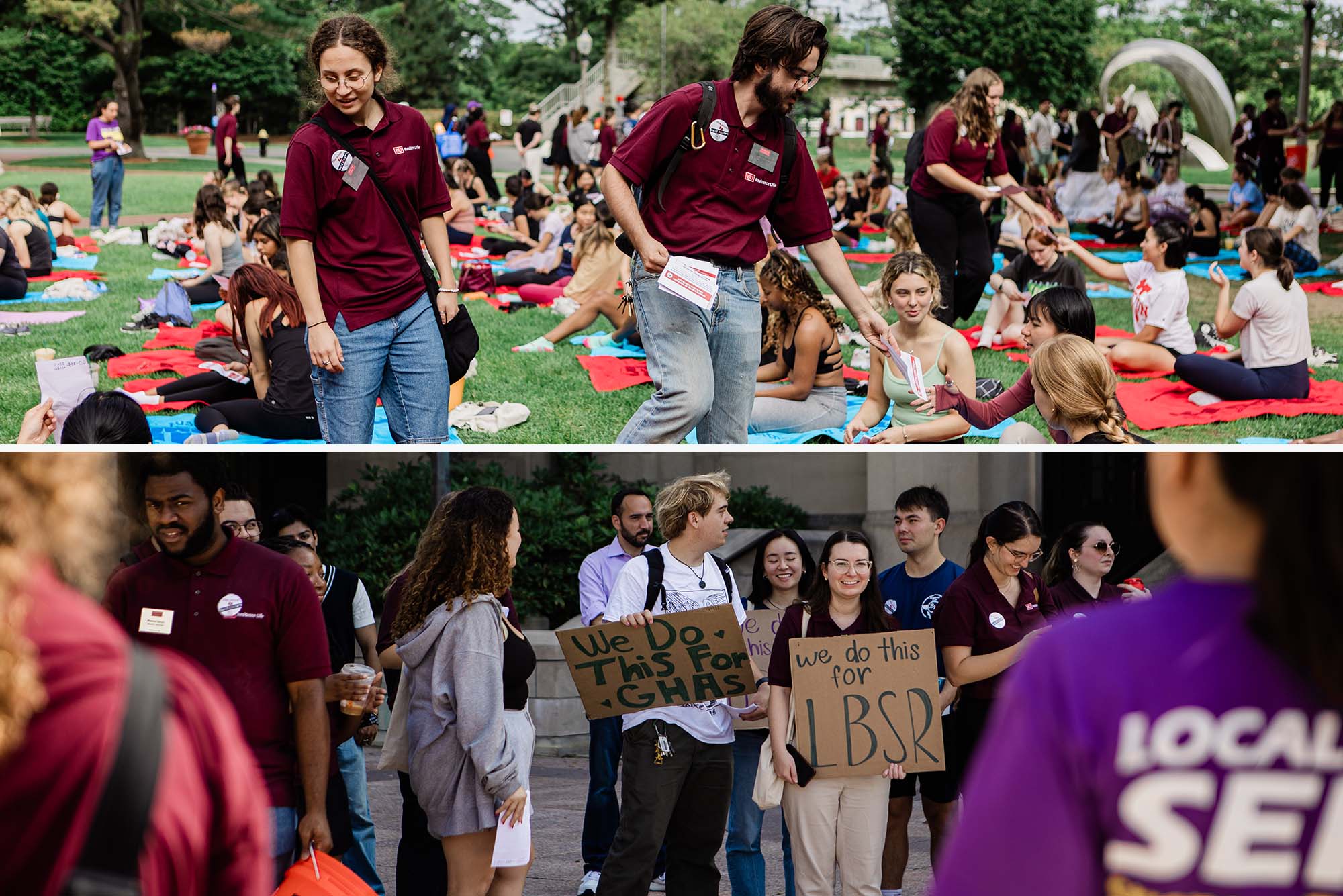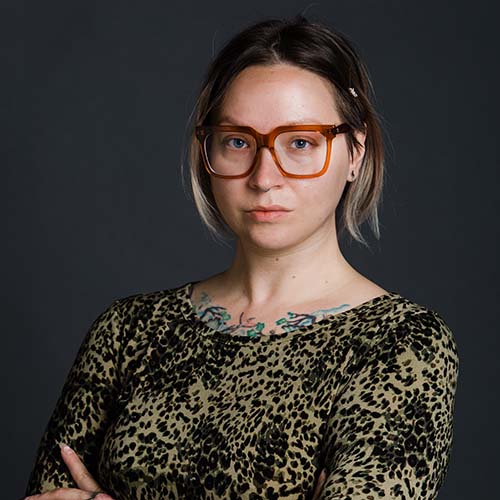BU RAs Begin Strike as Move-In Winds Down
With the next bargaining session approaching with the 300-member Residence Life Union, disruption from walk-out appears minimal

A group of about 50 resident assistants at Boston University participated in a strike on Saturday during BU’s annual Move-In.
BU RAs Begin a Strike as Move-in Winds Down
With the next bargaining session with the 300-member Residence Life Union approaching, disruption from walkout appears minimal
A group of approximately 50 members of Boston University’s Residence Life Union walked off their jobs on Saturday, protesting the lack of a new contract for their union, a job action aimed at disrupting students moving into campus for the start of the 2024-2025 academic year.
After the height of BU’s Move-in earlier in the week, approximately 1,700 students were expected to arrive on Saturday, with 1,200 more moving in Sunday and the final 500 on Monday. But it did not appear the strike had much impact on arriving students across most of campus. On West Campus, around Claflin Hall and Rich Hall, Move-in proceeded smoothly Saturday.
Wearing their maroon RA shirts and holding signs that read, “We do this for you Warren [Towers],” “We do this for West,” and “Fight for You,” the group marched in several places around campus, from Marsh Plaza to the BU Beach to Silber Way, handing out leaflets that said, “ResLife United in the Fight for a Fair Contract,” and speaking to students. During their rolling walkout, they chanted, “Who are we doing this for? All of us!”
“We acknowledge they have a right to strike and we are giving them the space to do that,” Jason Campbell-Foster, University dean of students, told BU Today Saturday afternoon. “We rely on our community and the compassion of so many in Residence Life and beyond who are still showing up for students. We continue to provide this world-class experience at Move-in and to cultivate this sense of belonging and to just limit the disruption to students moving in. We are seeing the community band together to make sure there are happy faces greeting the students.”
The union, which is part of the Service Employees International Union (SEIU) 509, is made up of nearly 300 resident assistants (RAs), graduate resident assistants (GRAs), and graduate hall assistants (GHAs). The strike occurred after the ResLife union authorized a strike vote on Friday, with 90 percent of their members who voted approving it (it’s unclear how many of the 300 actually voted).
“I don’t know much about the RA strike; I just got here yesterday,” said one new student, Jack Flaherty (ENG’28), who was observing the strike on Marsh Plaza. “But they can do whatever they want—that’s the whole point of a campus.”
Because not all of the RAs were on scheduled shifts Saturday, it’s possible more of them could strike on Sunday and Monday. It’s unclear if the strike will last only through the long weekend or longer.
“We represent one of the most diverse groups on campus, from a lot of socioeconomic and racial backgrounds,” Jacob Leal (STH’26), a striking residence hall graduate supervisor, said. “We realized that there were issues within the job, and we wanted to do something about it. We decided to see how many people we could pull together, and this was the result of that.”
The members of the Residence Life Union are sophomores, juniors, seniors, and graduate students who were chosen for their ability to lead and build community. Their responsibilities include addressing residence hall rules and building a tight-knit community among the students in their respective dorms. When issues such as roommate problems, student conflicts, and campus crises arise, they are often the first line of response because they live in the dorms with other students. Their compensation includes free housing (worth approximately $11,000 to $20,000), while some also get free or discounted meal plans, which can be valued at an additional several thousand dollars.
The next bargaining session between the union and the University, which would be the 16th session since December 2023, is scheduled for Thursday, September 5.
“This strike comes at a time of significant importance for you as residents of campus housing, and our focus remains on ensuring that you receive a high-level of service and care as you settle into your community for the fall semester,” Campbell-Foster said in a statement emailed to BU students Saturday afternoon. “Despite this action by the union, move-in operations will continue as planned throughout the weekend, and programs designed to help you become acquainted with one another will be held.”
Despite this action by the union, move-in operations will continue as planned throughout the weekend, and programs designed to help you become acquainted with one another will be held.
“We are committed to fair, transparent, and respectful bargaining sessions that benefit both the University and our RAs,” he added in his statement. “Significant progress has been made during regularly scheduled sessions, and we are awaiting counterproposals from the union that are critical to reaching an agreement.”
Campbell-Foster referred students to a Frequently Asked Questions website about the progress of the talks. The site says that BU’s latest offer includes meal plans for all RAs (meals are currently provided only to RAs in dormitory-style accommodations); a $1,000 stipend per semester for all RAs, with an additional $500 per semester for GRAs with supervisory responsibilities; a new grievance and third-party arbitration provision to provide a formal process for employees to resolve workplace issues; and access to optional training for NARCAN and CPR administration, free of charge to all members of the bargaining unit.
Saturday’s strike, which occurred four months after the RA union authorized another four-day strike back in April, raised questions about the legality of what the National Labor Relations Board (NLRB) refers to as “intermittent” strikes. According to the NLRB, “workers who engage in intermittent strikes, or strikes that involve ‘a plan to strike, return to work, and strike again,’ are not protected.”
The same issue has occurred with BU’s graduate students, who are in the midst of their own strike and contract negotiation with the University. BU officials say they are aware of the NLRB language around intermittent strikes and are looking into it.
The leaflets the union handed out say, “Welcome back, students and families! Did you know that ResLife workers have been in union contract negotiations with BU since December 2023? While we’ve secured some important contract improvements, we continue to fight for a strong contract we all deserve!” The leaflets note that RAs are still fighting for fair wages, solutions to health and safety issues, and workload protections.
“This is a really important week for us,” said Melissa Taylor (CAS’24, Wheelock’24), a striking residence hall worker. “We, as RAs, are very disappointed to not get to be participating in Move-in, because we love the feeling of getting to see new freshmen come in and experience all the excitement. We are ready to get back to the job as soon as we can, as soon as BU shows up to the bargaining table with a fair offer.”
In closing his letter, Campbell-Foster noted that “our student employees are an important part of our residential community. Our attention remains on providing all of you with an exceptional living experience. Thank you for your patience while we navigate the strike period.”




Comments & Discussion
Boston University moderates comments to facilitate an informed, substantive, civil conversation. Abusive, profane, self-promotional, misleading, incoherent or off-topic comments will be rejected. Moderators are staffed during regular business hours (EST) and can only accept comments written in English. Statistics or facts must include a citation or a link to the citation.